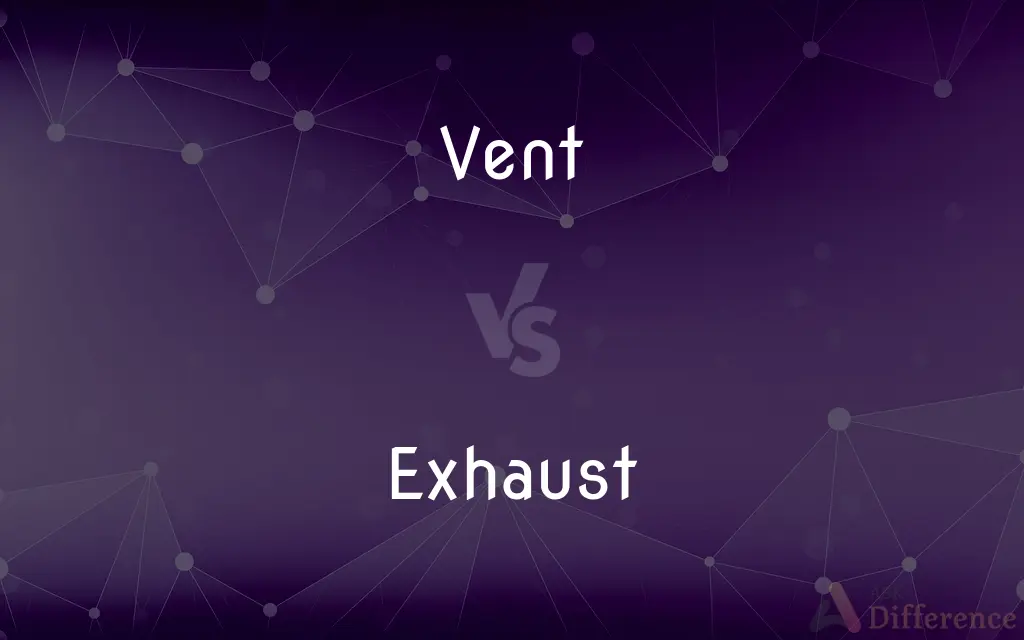Vent vs. Exhaust — What's the Difference?
By Maham Liaqat & Fiza Rafique — Updated on April 30, 2024
Venting involves the release or distribution of substances from enclosed spaces, enhancing air quality, while exhaust systems expel gases and heat from engines, often outdoors.

Difference Between Vent and Exhaust
Table of Contents
ADVERTISEMENT
Key Differences
Venting is primarily used to disperse air or gases within buildings to maintain air quality and prevent moisture buildup, ensuring a comfortable and safe indoor environment. On the other hand, exhaust systems are crucial in mechanical and automotive contexts, where they manage the expulsion of combustion by-products such as carbon monoxide and heat from an engine to the exterior, crucial for operational safety and efficiency.
Vents are often simpler in design and may consist of various passive or mechanical systems like windows, grilles, or fans that help in maintaining airflow. Whereas, exhaust systems typically involve more complex components like pipes, mufflers, and catalytic converters, designed to safely transport and often treat harmful emissions before releasing them into the environment.
The function of venting is also to equalize air pressure within environments, which helps in reducing odors and preventing dampness. Conversely, exhaust systems not only remove unwanted gases but are also engineered to reduce noise and filter out pollutants to meet environmental standards.
In homes and commercial buildings, vents are integrated into systems like HVAC to control climate and freshness of air, which contributes to energy efficiency and health. Exhaust systems, while also found in buildings for purposes like expelling heat from boilers, are more prominently recognized in vehicles and industrial equipment where they are essential for engine performance and longevity.
Vents can be adjusted manually or controlled automatically to adapt to different needs and conditions inside a building, promoting versatility and user control. Exhaust systems, however, often require precise engineering and maintenance to ensure they function correctly and comply with legal emissions regulations.
ADVERTISEMENT
Comparison Chart
Primary Use
Improving indoor air quality
Expelling gases and heat from engines
Location
Buildings, enclosed spaces
Vehicles, industrial equipment
Components
Grilles, ducts, fans
Pipes, mufflers, catalytic converters
Functionality
Air distribution, moisture control
Gas expulsion, pollution reduction
Regulatory Importance
Building codes, health standards
Emission controls, environmental regulations
Compare with Definitions
Vent
To express feelings, especially in a forceful and emotional manner.
She vented her frustration loudly during the meeting.
Exhaust
The expulsion or escape of gas or steam.
There was a noticeable exhaust of steam from the pipes.
Vent
An opening designed to allow air, gas, or liquid to pass out of or into a confined space.
He checked the vent to ensure it was clear of any blockages.
Exhaust
To drain of strength or energy.
After the long trek, the hikers were completely exhausted.
Vent
A device that allows air to enter or leave a confined space.
The office's heating system was regulated through a series of strategically placed vents.
Exhaust
A system or process of discharging waste gases or air.
The new kitchen design includes an advanced exhaust system above the stove.
Vent
A means of escape or release from a confined space.
The vent in the attic was also used as an emergency exit.
Exhaust
Gases ejected from an engine as waste products.
The exhaust from the truck was visibly dark, indicating a possible malfunction.
Vent
The act of releasing air or gas.
The system was designed to vent hydrogen safely into the atmosphere.
Exhaust
To use something up completely.
The long war had exhausted the country's resources.
Vent
Forceful expression or release of pent-up thoughts or feelings
Give vent to one's anger.
Exhaust
To make extremely weary; wear out.
Vent
An opening permitting the escape of fumes, a liquid, a gas, or steam.
Exhaust
To escape or pass out
Steam exhausts through this valve.
Vent
The small hole at the breech of a gun through which the charge is ignited.
Exhaust
The escape or release of vaporous waste material, as from an engine.
Vent
(Zoology) The excretory opening of the digestive tract in animals such as birds, reptiles, amphibians, and fish.
Exhaust
The fumes or gases so released.
Vent
The opening of a volcano in the earth's crust.
Exhaust
A duct or pipe through which waste material is emitted.
Vent
An opening on the ocean floor that emits hot water and dissolved minerals.
Exhaust
An apparatus for drawing out noxious air or waste material by means of a partial vacuum.
Vent
A slit in a garment, as in the back seam of a jacket.
Exhaust
(transitive) To draw or let out wholly; to drain off completely.
The water was exhausted out of the well.
Moisture of the earth is exhausted by evaporation.
Vent
To express (one's thoughts or feelings, for example), especially forcefully.
Exhaust
(transitive) To empty by drawing or letting out the contents
To exhaust a well
To exhaust a treasury
Vent
To release or discharge (steam, for example) through an opening.
Exhaust
To use up; to deplete, drain or expend wholly, or until the supply comes to an end
My grandfather seemingly never exhausts his supply of bad jokes.
To exhaust one's resources
To exhaust all possibilities
You're exhausting my patience.
I exhausted my strength walking up the hill.
Vent
To provide with a vent.
Exhaust
(transitive) To tire out; to wear out; to cause to be without any energy.
The marathon exhausted me.
Vent
To vent one's feelings or opinions
Sorry to go on like that, but I just had to vent.
Exhaust
(transitive) To discuss thoroughly or completely.
That subject has already been fully exhausted.
Vent
To be released or discharged through an opening.
Exhaust
To subject to the action of various solvents in order to remove all soluble substances or extractives.
To exhaust a drug successively with water, alcohol, and ether
Vent
To rise to the surface of water to breathe. Used of a marine mammal.
Exhaust
To expel (as exhaust).
Vent
An opening through which gases, especially air, can pass.
The vent of a cask; the vent of a mould
Exhaust
(intransitive) To discharge or escape (as exhaust).
Vent
A small aperture.
Exhaust
A system consisting of the parts of an engine through which burned gases or steam are discharged; see also exhaust system.
Vent
An opening in a volcano from which lava or gas flows.
Exhaust
The steam let out of a cylinder after it has done its work there.
Vent
A rant; a long session of expressing verbal frustration.
Exhaust
The dirty air let out of a room through a register or pipe provided for the purpose.
Vent
The excretory opening of lower orders of vertebrates.
Exhaust
An exhaust pipe, especially on a motor vehicle.
Vent
A slit in the seam of a garment.
Exhaust
Exhaust gas.
Vent
The opening at the breech of a firearm, through which fire is communicated to the powder of the charge.
Exhaust
(obsolete) Exhausted; used up.
Vent
In steam boilers, a sectional area of the passage for gases divided by the length of the same passage in feet.
Exhaust
To draw or let out wholly; to drain off completely; as, to exhaust the water of a well; the moisture of the earth is exhausted by evaporation.
Vent
Opportunity of escape or passage from confinement or privacy; outlet.
Exhaust
To empty by drawing or letting out the contents; as, to exhaust a well, or a treasury.
Vent
Emission; escape; passage to notice or expression; publication; utterance.
Exhaust
To drain, metaphorically; to use or expend wholly, or till the supply comes to an end; to deprive wholly of strength; to use up; to weary or tire out; to wear out; as, to exhaust one's strength, patience, or resources.
A decrepit, exhausted old man at fifty-five.
Vent
Ventriloquism.
Exhaust
To bring out or develop completely; to discuss thoroughly; as, to exhaust a subject.
Vent
(obsolete) A baiting place; an inn.
Exhaust
To subject to the action of various solvents in order to remove all soluble substances or extractives; as, to exhaust a drug successively with water, alcohol, and ether.
Vent
Clipping of ventilationor ventilator.
I have adjusted the vent settings.
Exhaust
Drained; exhausted; having expended or lost its energy.
Vent
(intransitive) To allow gases to escape.
The stove vents to the outside.
Exhaust
Pertaining to steam, air, gas, etc., that is released from the cylinder of an engine after having preformed its work.
Vent
(transitive) To allow to escape through a vent.
Exhaust is vented to the outside.
Exhaust
The steam let out of a cylinder after it has done its work there.
Vent
To express a strong emotion.
He vents his anger violently.
Can we talk? I need to vent.
Exhaust
The foul air let out of a room through a register or pipe provided for the purpose.
Vent
To snuff; to breathe or puff out; to snort.
Exhaust
Gases ejected from an engine as waste products
Vent
To sell; to vend.
Exhaust
System consisting of the parts of an engine through which burned gases or steam are discharged
Vent
To ventilate; to use a ventilator; to use ventilation.
Exhaust
Wear out completely;
This kind of work exhausts me
I'm beat
He was all washed up after the exam
Vent
Sale; opportunity to sell; market.
There is no vent for any commodity but of wool.
Exhaust
Use up (resources or materials);
This car consumes a lot of gas
We exhausted our savings
They run through 20 bottles of wine a week
Vent
A baiting place; an inn.
Exhaust
Deplete;
Exhaust one's savings
We quickly played out our strength
Vent
A small aperture; a hole or passage for air or any fluid to escape; as, the vent of a cask; the vent of a mold; a volcanic vent.
Look, how thy wounds do bleed at many vents.
Long 't was doubtful, both so closely pent,Which first should issue from the narrow vent.
Exhaust
Use up the whole supply of;
We have exhausted the food supplies
Vent
The anal opening of certain invertebrates and fishes; also, the external cloacal opening of reptiles, birds, amphibians, and many fishes.
Exhaust
Create a vacuum in (a bulb, flask, reaction vessel, etc.)
Vent
The opening at the breech of a firearm, through which fire is communicated to the powder of the charge; touchhole.
Vent
Fig.: Opportunity of escape or passage from confinement or privacy; outlet.
Vent
Sectional area of the passage for gases divided by the length of the same passage in feet.
Vent
Emission; escape; passage to notice or expression; publication; utterance.
Without the vent of words.
Thou didst make tolerable vent of thy travel.
Vent
To sell; to vend.
Therefore did those nations vent such spice.
Vent
To snuff; to breathe or puff out; to snort.
Vent
To let out at a vent, or small aperture; to give passage or outlet to.
Vent
To suffer to escape from confinement; to let out; to utter; to pour forth; as, to vent passion or complaint.
The queen of heaven did thus her fury vent.
Vent
To utter; to report; to publish.
By mixing somewhat true to vent more lies.
Thou hast framed and vented very curious orations.
Vent
To scent, as a hound.
Vent
To furnish with a vent; to make a vent in; as, to vent. a mold.
Vent
A hole for the escape of gas or air
Vent
External opening of urinary or genital system of a lower vertebrate
Vent
A fissure in the earth's crust (or in the surface of some other planet) through which molten lava and gases erupt
Vent
A slit in a garment (as in the back seam of a jacket)
Vent
Activity that releases or expresses creative energy or emotion;
She had no other outlet for her feelings
He gave vent to his anger
Vent
Give expression or utterance to;
She vented her anger
The graduates gave vent to cheers
Vent
Expose to cool or cold air so as to cool or freshen;
Air the old winter clothes
Air out the smoke-filled rooms
Common Curiosities
What are common components of an exhaust system?
Typical components include exhaust pipes, mufflers, and catalytic converters.
Can vents serve multiple purposes in a building?
Yes, vents can manage airflow, control odors, and help in temperature regulation.
How does vent placement affect its effectiveness?
Proper placement can maximize air flow and efficiency in maintaining indoor environmental quality.
What is the main purpose of a vent?
Vents are designed to improve air quality and manage air pressure within enclosed spaces.
How does an exhaust system work in a car?
It expels combustion by-products from the engine to the rear or side of the car, often treating them to reduce pollutants.
Is venting necessary in all buildings?
Yes, to some extent, all buildings require some form of venting to ensure air quality and comfort.
Can an exhaust system improve engine performance?
Yes, a well-designed exhaust system can improve engine efficiency and performance.
Do exhaust systems need regular maintenance?
Yes, regular maintenance is crucial to ensure they function efficiently and meet emission standards.
What regulations affect exhaust systems?
Exhaust systems are subject to environmental regulations and emissions standards, particularly in vehicles.
What factors determine the efficiency of an exhaust system?
Factors include design, maintenance, and compliance with emission standards.
What risks are associated with improper venting?
Improper venting can lead to poor air quality, moisture problems, and health risks.
Are there energy-efficient venting solutions?
Yes, various energy-efficient venting options are available that help reduce overall energy consumption in buildings.
Can the design of vents be customized?
Yes, vents can be designed and adjusted to meet specific architectural and functional needs.
How does the complexity of exhaust systems compare to vents?
Exhaust systems are generally more complex due to their need to handle and treat high-temperature gases.
What is the environmental impact of exhaust systems?
If not properly managed, they can contribute significantly to air pollution.
Share Your Discovery

Previous Comparison
Dent vs. Scratch
Next Comparison
Convoluted vs. InvolutedAuthor Spotlight
Written by
Maham LiaqatCo-written by
Fiza RafiqueFiza Rafique is a skilled content writer at AskDifference.com, where she meticulously refines and enhances written pieces. Drawing from her vast editorial expertise, Fiza ensures clarity, accuracy, and precision in every article. Passionate about language, she continually seeks to elevate the quality of content for readers worldwide.
















































